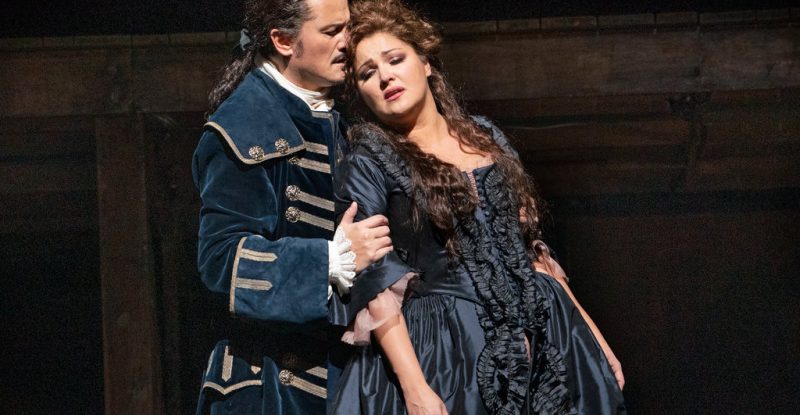Backstage at the Comédie-Française in the Paris of 1730, the title character of Francesco Cilea’s “Adriana Lecouvreur,” a leading actress with the company, demurs when hailed by a prince and an abbé as a muse, a goddess, a siren.
No, Adriana answers in the short, soaring aria “Io son l’umile ancella.” She is a humble maidservant of the creative spirit who provides the words, the delicate instrument that serves the creator’s hand.
When we meet her she is hopelessly in love with a dashing young man, Maurizio, whom she believes to be an ensign to a count. (He actually is the Count of Saxony.) But even before we see the lovers together, Ms. Netrebko, for all the charisma and allure she conveyed with her glamorous presence and her plush, intensely beautiful singing, suggested how uncertain Adriana feels. Emphasizing three crucial words, she sang that her life is quiet, happy and terrible. Terrible? Yes, in a way. You believed that this artist, who constantly recreates herself in public, would in life be all too vulnerable to the jealousies of rivals, the fawning of admirers, and the passions of a hotheaded, prevaricating young man. Actually, Cilea created this 1902 opera as a surefire vehicle for a prima donna, so it’s always hard to take Adriana’s words seriously when a soprano sings them. But on Monday at the Metropolitan Opera’s New Year’s Eve gala premiere of a new production of “Adriana,” Anna Netrebko turned this aria into the aching expression of a woman who triumphs on the stage but muddles through life.
Also, the truth is that for all the lyrical richness, melodramatic fervor and stylish evocations of Parisian courtly and theatrical life in 1730, this opera, the only one by Cilea that turns up now and then in production, needs all the help it can get from artists of Ms. Netrebko’s stature. It’s a good and effective, but not great, work. The light touch that Cilea brings to bear, while preventing the drama from slipping into mawkish excess, sometimes feels musically thin.
“Adriana” must have a superior cast and conductor to succeed. The Met is providing that and more with this David McVicar staging, which replaces the musty 1963 production created for Renata Tebaldi. The tenor Piotr Beczala, singing with youthful fervor, ardent lyricism and clarion top notes, is ideal as the impetuous Maurizio. While suggesting how smitten he is by Adriana, he comes across as a young man on the move. With his royal position looking risky, he proves himself through military exploits. But we learn that he is also disentangling himself from an advantageous liaison with the married Princess of Bouillon, who refuses to let him go.





